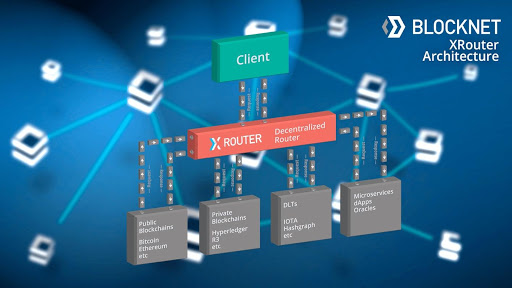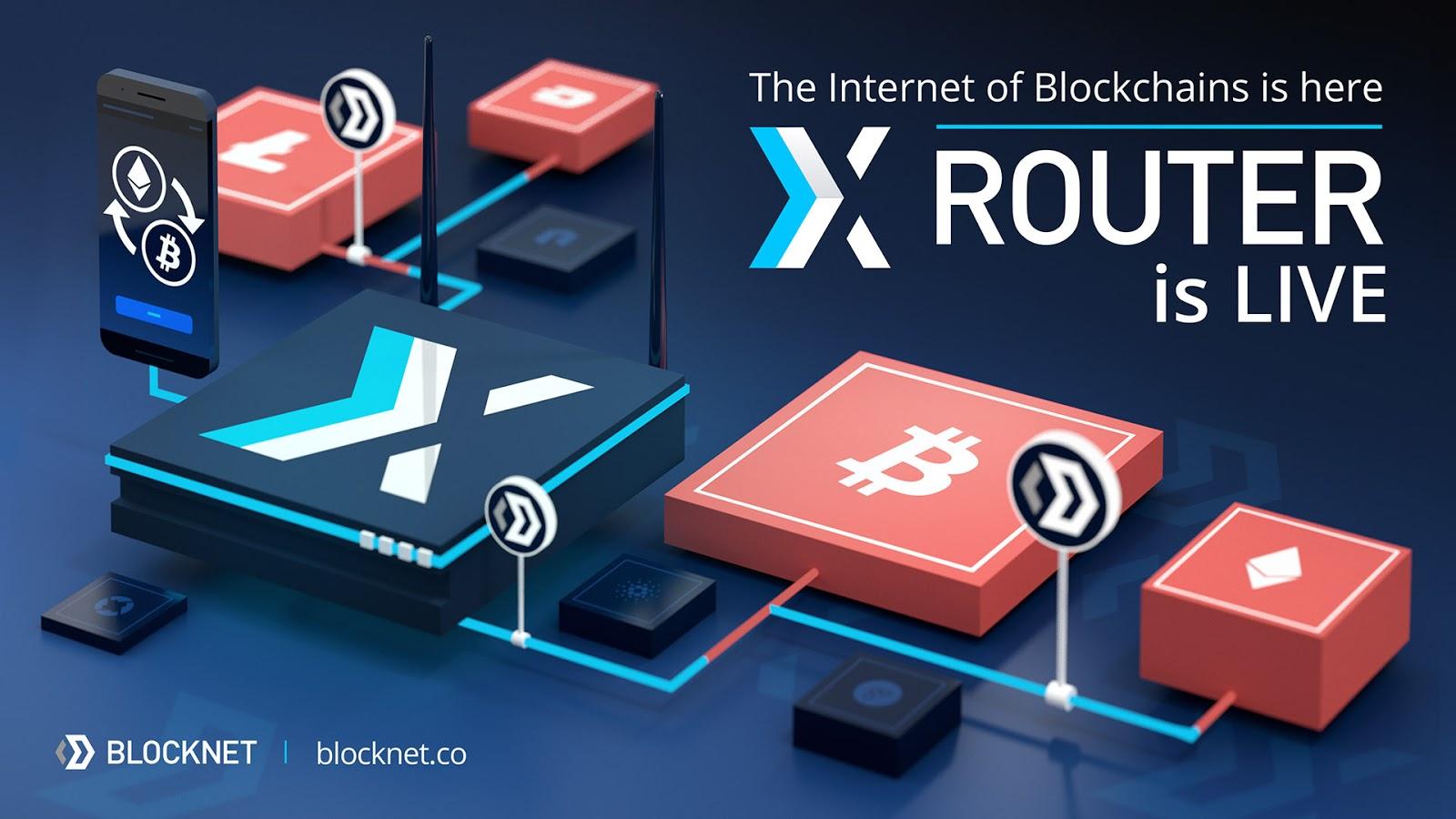
Blocknet has released the beta version of XRouter, the world’s first blockchain router. XRouter opens the door for multi-chain, lightweight dApps to harness contracts and protocols from different blockchains, allowing them to communicate and use each others’ specific features. XRouter lays the foundation for multi-blockchain architectures and an “Internet of Blockchains”.
XRouter is one part of the Blocknet Protocol, an infrastructure for a new era of cross-blockchain communication. The Blocknet Protocol enables the technologies on any blockchain to become available via decentralized APIs, creating a paradigm shift from monolithic architecture development to microservice and multi-chain architectures and heralds the Internet of Blockchains. You can download the Blocknet wallet with XRouter here. (In the future, the Blocknet wallet will not be required)
But what is the “Internet of Blockchains,”? What does it actually mean in real terms?
An Internet of Blockchains (IoB)
A simple analogy would be that the Blocknet Protocol and XRouter is like the Netflix or Spotify for blockchains. Years ago, you had to walk to your local video store, choose a video and then return home. Then, as the industry evolved it became possible to download music and movies instead. But even then, this could sometimes take hours and took up a great deal of space on your hard drive. Recently, with the arrival of online audio and visual streaming services, access became instant and the need to download media was no longer a requirement. XRouter enables the same thing. Instead of waiting days to download whole blockchains, (the BTC blockchain is now over 240 GB) XRouter is able to offer instant, decentralized access to any blockchain without the need to download the blockchain, and as is the case with Netflix and Spotify, this saves time and storage space.
XRouter was designed from the ground up to provide interoperability with ANY and ALL blockchains, including all DTL and private chains such as IOTA, Hashgraph, Hyperledger, and D3. There is no limit on the data XRouter can consume and verify – including any external data source in an oraclized manner. XRouter is not limited in any way, shape, or form and is compatible with all blockchains. By allowing blockchains to integrate with each other (directly chain to chain, without being a middleman to the data itself), XRouter gives people, companies, industries, and developers the ability to utilize different blockchains for any dApp they desire and decentralizes the API ecosystem.
Developers can begin building dApps right now on multiple blockchains and platforms including EOS, Ethereum, Stellar, Cardano, Tron, XRP, Monero, IOTA, NEO, Vechain, NEM, Waves and many more. The possibilities of mixing and matching the functionality of different blockchains to create groundbreaking dApps are almost endless. XRouter API details can be viewed here.

The Potential of Cross-blockchain DApps and Multichain Architectures
XRouter allows for the monetisation of inter-chain and multi-chain services.
Supply Chain
In supply chain there will be multiple blockchains being used at various steps of the process much like there is today with traditional software stacks. The Blocknet Protocol and XRouter would allow information to be accessible between these different blockchains. For Example, pharmaceutical manufacturers have strict regulations to follow and need to provide certain information and assurances. Being able to access batch information from the raw materials being consumed, temperature and humidity information during transportation, and final destinations are all important. A smart contract utilizing XRouter to gather this information from each respective chain and write it to the pharmaceutical’s blockchain along with the batch code. XRouter would enable this communication to occur in a trustless way, which is important to ensure validity of the information.
Storage and Hosting
If creating a dApp on Ethereum, you may require storage functionality. Ethereum doesn’t intrinsically handle file storage very efficiently. In this scenario, XRouter can be used to interact with other blockchains such as Storj, Filecoin, Sia, or Swarm to utilize their storage services.
Media and Content
For content creation, a creator has the option of publishing to the LBRY Credits or Alexandria blockchains. Similar to HootSuite, which is a tool that allows posting to multiple social media platforms simultaneously, a dApp can be created using XRouter that offers the same benefit. The user can post their content once, whether it’s audio, video, literature, or art, and have it published to Alexandria’s and LBRY Credit’s blockchain platform simultaneously.
Markets
There are many blockchains creating decentralized marketplaces including Origami, District0x, OpenBazaar, and Syscoin’s marketplace, but the offering of products are relatively low on each independent platform. A dApp that utilizes XRouter to aggregate all the products into a single hub would offer a lot more options to users and a fuller marketplace. It can also make publishing products easier by publishing to all platforms simultaneously through a single form, offering more exposure than posting to a single marketplace while saving time.
Business and Industry
There are many dApps and blockchains that will end up using health data. Rather than submitting health data to each application, a universal EHR (Electronic Health Record) blockchain can be created to manage personal medical data and accessibility of data by each application. The health data on this EHR ledger can be shared amongst healthcare providers, hospitals, and insurance blockchains, dApps, and applications via XRouter.
Certifications
Certifications and licensing records can be stored on a dedicated blockchain where they could be verified by a dApp built on the Blocknet Protocol. These records can be used to confirm qualifications and grant access or permissions.
Developers wanted for the Beginning of a New Ecosystem
Blocknet enables the creation of a multitude of cross-chain dApps and multichain architectures only limited by developers imaginations. If you want to build for XRouter or have any questions, please join our Discord or check out our Reddit page. You can download the Blocknet wallet with XRouter here. (In the future, the Blocknet wallet will not be required).
By building on the Blocknet Protocol, and joining the “Internet of Blockchains,” developers will help to evolve a decentralized crypto-ecosystem with a trustless security model, which has the ability to monetize tokens native to any blockchain. In addition, the Blocknet Protocol allows over 100 digital assets to be traded on Block DX, a 100% decentralized exchange dApp built on the protocol where the ability to list an asset is open and free, and your funds are in your control at all times as no third party is ever involved. Cloudchain Inc. is currently implementing a fully decentralized lite (thin) multi-wallet utilizing Blocknet’s XRouter protocol.
To learn more about XRouter, Block DX and Blocknet, check out Blocknet’s website, API, documentation, Discord, and whitepaper.


















